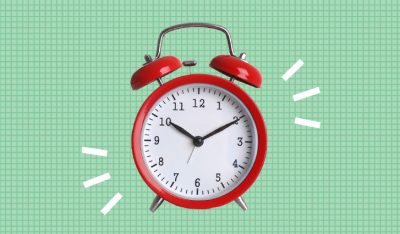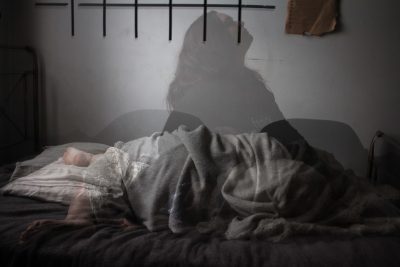Table of Contents
In our pursuit of healthy sleep, many of us try to follow the mandates of sleep hygiene. Keep the bedroom cool and quiet, switch off electronics, and avoid eating and drinking before bed. But what if we’re hungry, or need to have a late dinner? Which foods are safe to eat close to bedtime, and which ones should we avoid? Can certain foods and drinks actually help us sleep?
Studies show that some foods and drinks contain compounds that support healthy sleep, while others promote wakefulness. Those that support sleep are often natural sources of the sleep-promoting hormone melatonin, which is released at night from the pineal gland in the brain. (1) Other sleep-friendly foods have sedative properties that induce a relaxation response or reduce anxiety.
Melatonin
A naturally occurring hormone that regulates sleep and wake cycles. Light signals inhibit melatonin release by the brain, while darkness signals stimulate release.
Note: The content on Sleepopolis is meant to be informative in nature, but it shouldn’t take the place of medical advice and supervision from a trained professional. If you feel you may be suffering from any sleep disorder or medical condition, please see your healthcare provider immediately.
How Food Affects Sleep
Sleep patterns are intricately connected to the timing of meals, the nutrients we consume, and how much we eat. (2) The circadian rhythm controls the body’s biological clocks, which regulate sleeping and waking, thirst and hunger, energy consumption, and metabolism. Like sleep, the digestive system follows a circadian rhythm. A sudden change in diet or eating habits can cause a shift in how we sleep, and vice versa. Just as diet affects sleep, sleep affects metabolism, fat storage, food cravings, and the way energy is used. (3)
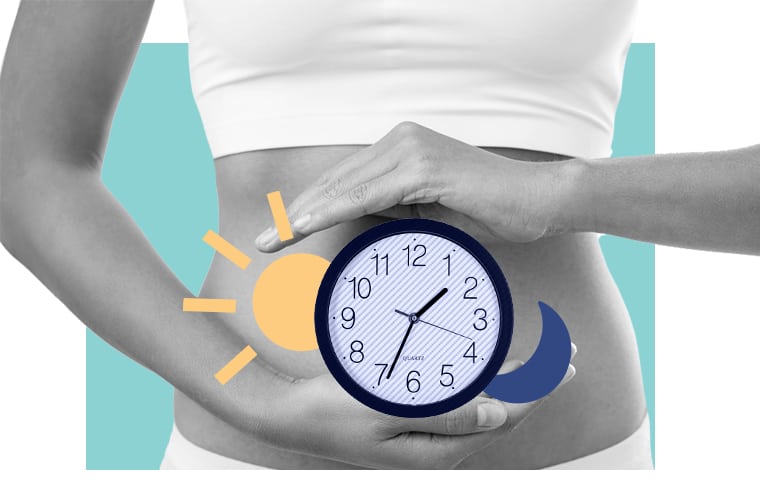
Sleep deprivation causes the metabolism to become sluggish and insulin sensitivity to drop. (4) This lack of sensitivity increases fat storage and cravings for “high-energy” foods that raise the blood sugar quickly, such as desserts and bread.
Ghrelin, the hormone responsible for making us hungry, increases when we don’t sleep enough, while leptin, the hormone that makes us feel full, decreases. Sleep deprivation not only raises ghrelin levels, it impairs the brain’s ability to make decisions, increasing the risk of poor food choices. Due to its effect on hormones and digestive organs, chronic sleep loss can lead to obesity, diabetes, stroke, and cardiovascular disease.
FAQ
Q: Why does lack of sleep increase appetite? A: The circadian rhythm of hunger hormones changes when we're sleep-deprived, increasing the desire to eat. The reward center of the brain changes, as well, making high-sugar and carbohydrate foods more appealing.High Carb Vs. Low Carb
Some studies show that high carbohydrate foods affect sleep differently from low carbohydrate foods. High carbohydrate foods such as white rice and French fries reduce slow-wave sleep, while low carbohydrate foods increase slow-wave sleep and reduce REM sleep. (5)
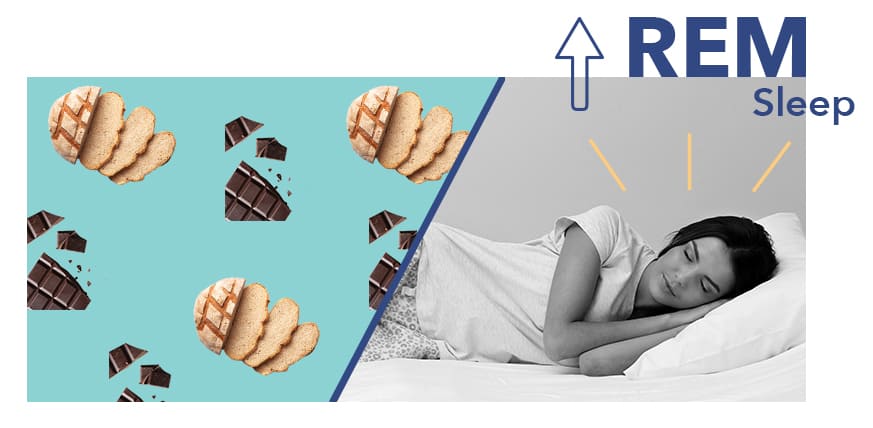
High carbohydrate foods appear to make it easier to fall asleep faster, but may make sleep as a whole less efficient and restful. (6) Eating foods that raise blood sugar may also lead to waking during the night as blood sugar drops, causing an increase in appetite and a surge in neurotransmitters related to alertness and hunger.
A sudden switch in carbohydrate consumption — from high to low or low to high — can alter sleep patterns. This may be due in part to the change in fat consumption, which typically increases with a low carbohydrate diet and decreases with a high carbohydrate diet. Once sleep patterns normalize, a low carbohydrate diet may help improve the quality and efficiency of sleep due to its effect on weight and chronic inflammation.
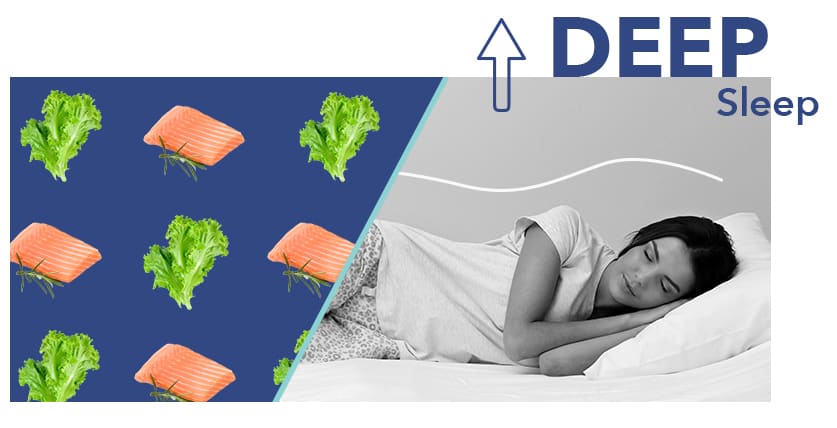
Studies on the impact of high fat and high protein diets on sleep are mixed, and more research is needed to determine if the effects are positive or negative. Most studies to date have been conducted on healthy volunteers with normal sleep patterns. Additional studies on people with sleep disorders may help illuminate the effect on sleep of specific diets and nutrients.
Foods That Help You Sleep
Foods containing certain natural substances appear to promote deeper and healthier sleep. These substances include tryptophan, magnesium, calcium, and melatonin, all of which are associated with healthy sleep cycles. (7)
Tryptophan
Tryptophan is an amino acid used by the body to create the B vitamin niacin. Niacin in turn is used to make serotonin, which acts as a precursor to the sleep-promoting hormone melatonin. (8) Foods that naturally contain tryptophan include:
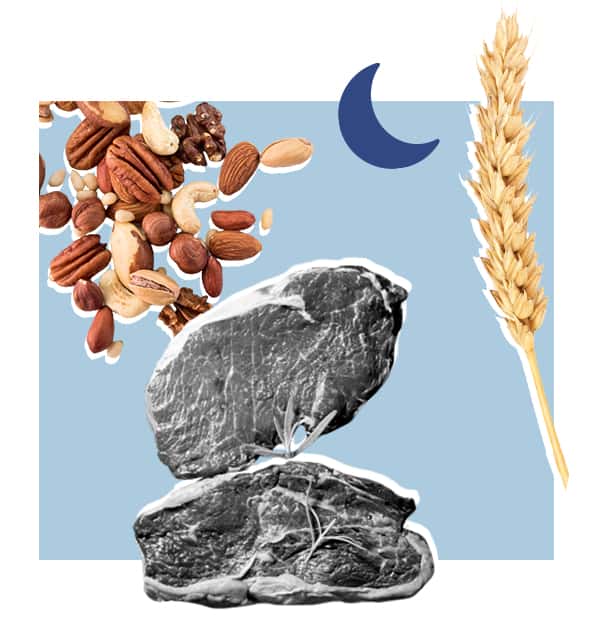
- Poultry such as turkey and chicken
- Dairy products
- Eggs
- Beans, lentils, and peas
- Fish and shellfish
- Whole grains
- Nuts and seeds
- Fruit
- Vegetables
Magnesium
Magnesium is a mineral involved in nerve and muscle function. Magnesium helps to regulate melatonin as well as important neurotransmitters in the nervous system, promoting relaxation and healthy muscle function.
Magnesium binds to receptors for a neurotransmitter called gamma-aminobutyric acid (GABA), which is essential to sleep. GABA is targeted by certain prescription sleep medications such as Ambien. Magnesium also helps the body regulate adrenaline, and may be useful for both sleep and anxiety.
Natural food sources of magnesium include:
- Dairy products
- Nuts and seeds
- Bananas
- Fish
Wheat germ, avocados, tofu, and the popular whole grain quinoa are also good sources of magnesium, as are supplements. Magnesium supplements may cause gastrointestinal upset, while foods containing magnesium typically do not.
GABA, or Gamma-Aminobutyric Acid
A neurotransmitter that prevents transmission of impulses between certain types of nerve cells in the brain.
Melatonin
While foods containing tryptophan and magnesium help promote healthy melatonin release, there are some foods that actually contain naturally occurring melatonin. Consumed before bed, these foods can augment melatonin release and make falling and staying asleep easier. These foods include:
- Fruits and vegetables, particularly tart cherries and kiwi
- Nuts and Seeds
- Whole grains
Calcium
Like tryptophan and magnesium, calcium aids in the production of melatonin. (9) Good sources of calcium include:
- Broccoli
- Dairy products
- Okra
- Sardines
- Soybeans
- Orange juice fortified with calcium
- Breads and grains enriched with calcium
Drinks That Help You Sleep
Moderate amounts of certain beverages can encourage sleep and induce a relaxation response. Some drinks have mild sedating effects, while others help promote the release of melatonin and related compounds.
Tart Cherry
Tart cherry fruit, also known as the Montmorency sour cherry, is a bright red and slightly bitter variety of cherry. The tart cherry contains more phytonutrients and vitamin A than the sweet cherry, but is less palatable eaten fresh.
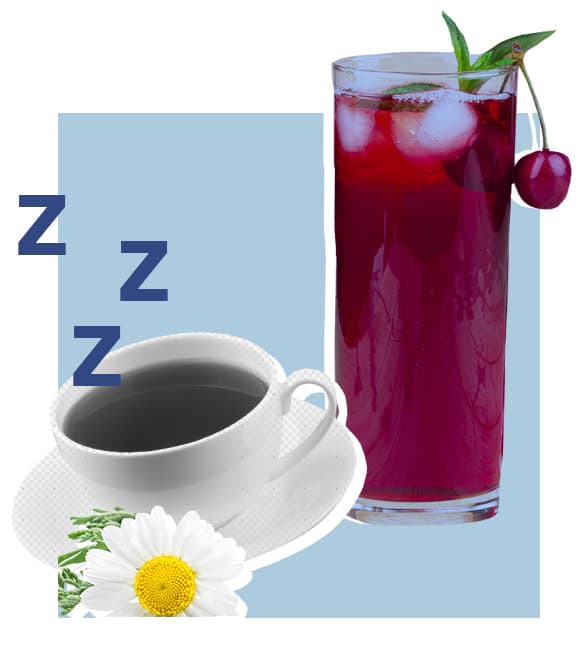
As a sleep supplement, tart cherry is available as a juice or in supplement form as capsules or extract. Studies show that tart cherry extract has a moderate sleep-promoting effect, approximately equal to valerian root tea or capsules. (10)
Though the effect is not as significant as that of prescription sleep medications, tart cherry may be helpful for those with mild difficulty falling or staying asleep. Taken at bedtime, tart cherry appears to increase levels of exogenous melatonin, or melatonin from a source outside the brain. One recent study showed that both sleep time and efficiency were improved in volunteers who drank tart cherry juice and then underwent a sleep study, or polysomnography.
In addition to melatonin, tart cherries contain tryptophan as well as high levels of polyphenols and vitamin C, which may help promote sleep by reducing unhealthy inflammation. (11)
Valerian Root Tea
Valerian tea is brewed from the stems and leaves of the valerian plant. Valerian root is a powerful natural sedative that may help promote sleep and relaxation and ease menstrual cramps. (12)
FAQ
Q: What is valerian? A: Valerian is a flowering perennial native to Europe and Asia. Its roots in particular have been used for medicinal purposes for thousands of years.Chamomile tea
Chamomile is known for its anxiety-reducing effects, especially when brewed in combination with lavender. Studies show that chamomile has mild sedating properties, and has traditionally been used to treat nightmares, insomnia, and digestive upset. (13)
Milk
Milk is a natural source of tryptophan, which is involved in the production of both serotonin and melatonin. Milk contains calcium, which helps to promote sleep, as well.
Hemp Milk and Other CBD Containing Drinks
Recent studies show that cannabidiol, or CBD, can reduce anxiety, which may help make falling asleep easier. Low doses of CBD may actually have the opposite effect, causing wakefulness in certain people. Higher doses of CBD may be more effective at promoting sleep.
Foods and Beverages That Can Disrupt Sleep
Some foods and drinks can promote healthy sleep, while others can make sleep more difficult. Though not everyone has the same response to caffeine or stimulating foods, certain substances tend to promote wakefulness, particularly when consumed at night. Food and drinks that can cause sleep difficulties include:
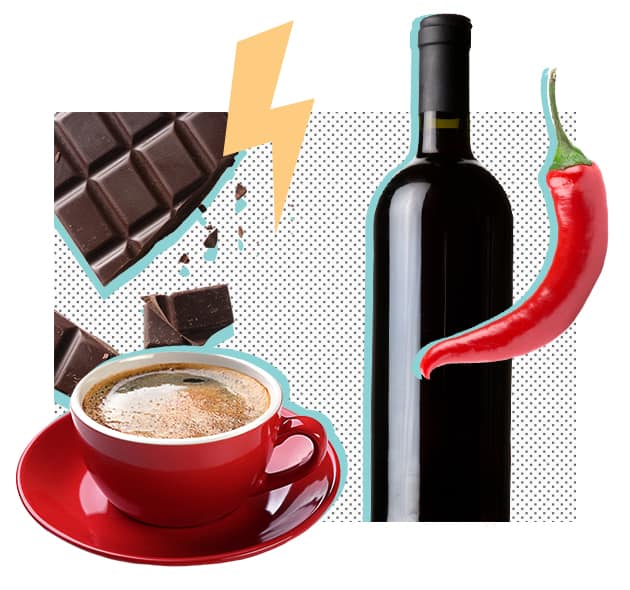
- Anything containing caffeine. Caffeine blocks brain receptors that are usually filled by adenosine, a neurotransmitter that makes us feel sleepy. Coffee, energy drinks, or soda containing caffeine can make falling asleep difficult and/or reduce sleep efficiency. Dark chocolate contains both caffeine and a chemically related substance called theobromine. Both have a stimulant effect, and can delay or disrupt sleep (14)
- Spicy foods. Spicy foods are stimulating to the digestive system and may cause heartburn or stomach upset. Though generally considered healthy, spicy foods can cause or exacerbate sleep difficulties when consumed too close to bedtime
- Alcohol. Alcohol consumed during the typical “happy hour” of early evening does not appear to disrupt sleep, while drinking later at night has been proven over decades of studies to change sleep architecture, make sleep less efficient, and cause waking during the night. (15) Alcohol can also suppress the REM cycle of sleep, leading to fewer dreams
- Foods high in fat. Some studies show that high-fat food may be linked to fragmented sleep and daytime sleepiness. (16) Foods high in fat can also cause digestive upset and heartburn when eaten before bed
- Foods high in protein High protein meals before bedtime can disturb the circadian rhythm and interrupt sleep. Protein takes longer to digest than other types of foods, keeping the digestive system active and potentially affecting sleep patterns
- Foods containing large amounts of water. Certain foods such as watermelon, cucumber, and cantaloupe add significant amounts of water to the body. Eaten before bed, water-rich foods can disrupt sleep by increasing urinary output. Drinking any sort of beverage before bed can have a similar effect on sleep, increasing waking to go to the bathroom
- Heavy meals before bedtime. No matter what the food, eating a heavy meal before bed can disrupt the circadian rhythm, “wake up” the digestive system, and make restful sleep more difficult
What To Eat Before Bed
If hunger strikes before bed, many sleep specialists recommend a light, nutritious snack rather than a full meal. Lighter fare can prevent delayed or interrupted sleep due to hunger and help preserve the circadian rhythm. Foods to choose before bed include the following:
- Almonds. Almonds are a natural source of melatonin as well as fiber and magnesium
- Sliced turkey. Sliced natural turkey is a good source of both tryptophan and protein
- Cottage cheese. A recent study showed that cottage cheese helped volunteers fall asleep faster and stay asleep longer. This may be due to its high tryptophan and magnesium content
- Kiwi. Kiwis are a natural source of serotonin, which helps regulate the production of melatonin
- Salmon, walnuts, and other sources of omega-3 fatty acids. Some research supports the connection between omega-3 consumption and healthy sleep patterns. Walnuts are also a good source of melatonin and plant protein
- Bananas. Bananas contain tryptophan and magnesium as well as potassium. Potassium has been shown in some studies to promote deeper and more efficient sleep
Drinks that can induce sleep include small amounts of chamomile and valerian root tea. Unsweetened tart cherry juice or tart cherry supplements have been shown in numerous studies to promote healthy production of melatonin and deeper sleep.
Last Word From Sleepopolis
Eating heavy meals before bed can interrupt the circadian rhythm, activate the digestive system, and cause heartburn and other gastrointestinal symptoms. Light snacks of sleep-promoting foods may make it easier to fall and stay asleep without causing the sleep disruption common with heavier meals. Avoiding stimulants such as caffeine, chocolate, and spices in the hours before bed can make falling asleep easier, while eating healthy foods such as almonds and cottage cheese can alleviate hunger and encourage healthy sleep patterns.
References
- Costello RB, Lentino CV, Boyd CC, O’Connell ML, Crawford CC, Sprengel ML, Deuster PA., The effectiveness of melatonin for promoting healthy sleep: a rapid evidence assessment of the literature, Nutrition Journal, Nov. 7, 2014
- Jean-Philippe Chaput, Sleep patterns, diet quality and energy balance, Physiology & Behavior, July 2014
- Eve Van Cauter, Metabolic consequences of sleep and sleep loss, Sleep Medicine, Sep. 2008
- Knutson KL, Spiegel K, Penev P, Van Cauter E., The Metabolic Consequences of Sleep Deprivation, Sleep Medicine Reviews, June 11, 2007
- Phillips F, Chen CN, Crisp AH, Koval J, McGuinness B, Kalucy RS, Kalucy EC, Lacey JH., Isocaloric diet changes and electroencephalographic sleep, Lancet, Oct. 1975
- Ahmad Afaghi, Helen O’Connor, Chin Moi Chow, High-glycemic-index carbohydrate meals shorten sleep onset, The American Journal of Clinical Nutrition,February 2007
- Hudson C, Hudson SP, Hecht T, MacKenzie J., Protein source tryptophan versus pharmaceutical grade tryptophan as an efficacious treatment for chronic insomnia, Nutritional Neuroscience, Apr. 2005
- Friedman M., Analysis, Nutrition, and Health Benefits of Tryptophan, International Journal of Tryptophan Research, Sep. 2018
- Meng X, Li Y, Li S, Zhou Y, Gan RY, Xu DP, Li HB., Dietary Sources and Bioactivities of Melatonin, Nutrients, Apr. 2017
- Pigeon WR, Carr M, Gorman C, Perlis ML., Effects of a tart cherry juice beverage on the sleep of older adults with insomnia: a pilot study, Journal of Medicinal Food, June 2010
- Kelley DS, Adkins Y, Laugero KD., A Review of the Health Benefits of Cherries, Nutrients, Mar. 2018
- Bent S, Padula A, Moore D, Patterson M, Mehling W., Valerian for Sleep: A Systematic Review and Meta-Analysis, The American Journal of Medicine, Dec. 2006
- Srivastava JK, Shankar E, Gupta S., Chamomile: A herbal medicine of the past with bright future, Molecular Medicine Reports, Nov. 1, 2010
- Wesensten, Nancy J., Performance and alertness effects of caffeine, dextroamphetamine, and modafinil during sleep deprivation, European Sleep Research Society, Dec. 2004
- Roehrs, Timothy,, Sleep, Sleepiness, and Alcohol Use, National Institute on Alcohol Abuse and Alcoholism
- Yingting Cao, Associations between Macronutrient Intake and Obstructive Sleep Apnoea as Well as Self-Reported Sleep Symptoms: Results from a Cohort of Community Dwelling Australian Men, Nutrients, Apr. 8, 2016
Subscribe Today!
Get the latest deals, discounts, reviews, and giveaways!
